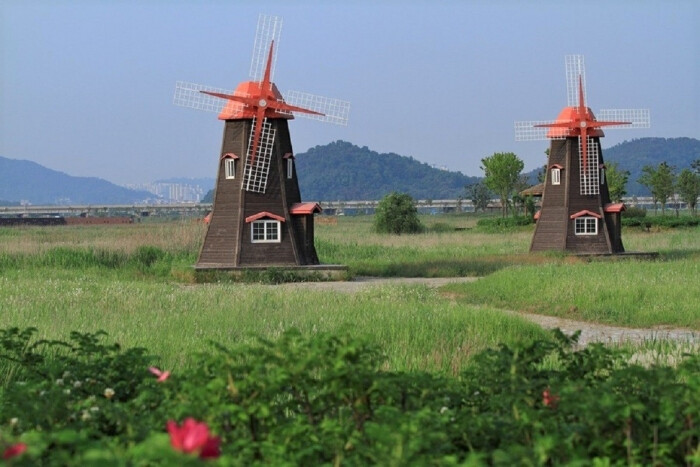
INCHEON, SOUTH KOREA – Sorae Ecology Park, initially established as a haven for biodiversity and migratory birds through the restoration of tidal flats, tidal creeks, and former salt pans, is facing a significant ecological challenge: "terrestrialization." This phenomenon, characterized by the increasing dominance of freshwater conditions and the proliferation of common reeds ( Phragmites australis), is progressively diminishing the park's unique brackish water ecosystem and consequently threatening its diverse array of flora and fauna, according to environmental advocates.
Established in May 2009 by the Incheon Metropolitan City, the 3.5 square kilometer park aimed to revitalize the ecological integrity of the area, providing crucial habitats for various wildlife, including migratory birds that rely on the intertidal mudflats for foraging and resting during their long journeys across continents. The park's initial design incorporated tidal creeks to ensure the natural ebb and flow of seawater, a critical factor in maintaining the salinity necessary for specialized brackish water and halophytic plant communities.
However, recent ecological surveys, including the 2019 'Study on Restoration Measures for Halophyte Communities in Incheon Sorae Ecology Park,' have revealed a concerning trend. Brackish water plant communities, once a significant component of the park's vegetation, now occupy a smaller proportion of the area (63.2%), concentrated mainly in the central and eastern sections. In stark contrast, salt-tolerant plants, such as Suaeda japonica, are confined to a mere 3.5% of the park's western fringes, the salt pan experience zone, and the vicinity of the reservoir. This decline coincides with the aggressive expansion of common reeds, a freshwater-tolerant species that thrives in the reduced salinity levels.
The ecological consequences of this "terrestrialization" are far-reaching. The dense growth of reeds encroaches upon the open mudflat areas essential for migratory birds like sandpipers, plovers, and various waterfowl, depriving them of feeding grounds and safe resting spots where they can easily spot predators. Furthermore, the shift towards a freshwater-dominated environment alters the habitat suitability for a range of aquatic and semi-aquatic species adapted to brackish conditions. This can lead to a decrease in overall biodiversity, potentially favoring species that can evade terrestrial predators by retreating into deeper freshwater, while disadvantaging those reliant on the unique characteristics of the intertidal zone.
Environmental organizations, such as the Incheon Federation for Environmental Movement, attribute this ecological shift to the compromised functionality of the park's tidal creeks. They argue that the construction of various facilities within the park boundaries, as outlined in the urban management plan, along with the artificial regulation of seawater flow through sluice gates rather than natural tidal exchange, has impeded the natural circulation of seawater. This disruption in tidal flow has led to a decrease in salinity levels within the park's wetlands, creating conditions conducive to the proliferation of freshwater vegetation like reeds.
Acknowledging the practical limitations of dismantling existing infrastructure like dikes, the Incheon Federation for Environmental Movement issued a strong statement on April 23rd, urging Incheon City to take immediate action to address the freshwaterization issue. Their recommendations include the prompt resolution of the internal wetland's freshening and the selective removal of reeds along the wetland edges, specifically within a five-meter radius of the water's surface, to provide safer resting areas for migratory birds.
In response to these concerns, a representative from Incheon City stated that a significant reed removal operation was conducted in 2023 and emphasized the city's ongoing commitment to ecological preservation efforts. However, environmental advocates argue that more comprehensive and long-term strategies are needed to restore the park's intended brackish water environment and safeguard its biodiversity. They stress the importance of exploring sustainable solutions to improve seawater circulation within the park, potentially through the modification of existing water management systems or the creation of new channels to mimic natural tidal flow.
The future ecological health of Sorae Ecology Park hangs in the balance. Without proactive and sustained intervention to reverse the trend of terrestrialization, this valuable urban green space risks losing the very ecological characteristics that led to its establishment, potentially diminishing its role as a vital habitat for migratory birds and a showcase of coastal biodiversity in the Incheon region. The need for a balanced approach that considers both urban development and ecological preservation has never been more critical for the long-term sustainability of Sorae Ecology Park.
[Copyright (c) Global Economic Times. All Rights Reserved.]






























